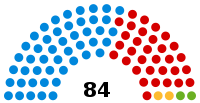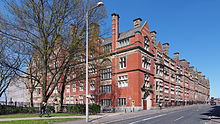Lancashire County Council
Lancashire County Council | |
|---|---|
 | |
 | |
| Type | |
| Type | County council |
| Leadership | |
Chair of the Council | Cllr Barrie Yates, Conservative |
Leader of the Council | Phillippa Williamson, Conservative since 10 May 2021 |
Chief executive | Angie Ridgwell |
| Structure | |
| Seats | 84 councillors |
 | |
Political groups |
|
Length of term | 3 years |
| Elections | |
| First Past the Post | |
Last election | 6 May 2021 |
Next election | 2024 |
| Meeting place | |
 | |
| County Hall, Preston, England | |
| Website | |
| www | |
Lancashire County Council is the upper-tier local authority for the non-metropolitan county of Lancashire, England. It consists of 84 councillors. After the 2017 Lancashire County Council election, the council is under Conservative control.
Prior to the 2009 Lancashire County Council election, the county had been under Labour control since 1985.
The Council leader, currently Councillor Phillippa Williamson chairs a cabinet of up to eight councillors. The Chief Executive and Director of Resources is Angie Ridgwell who was appointed in January 2018.
History[]
The council was established in 1889 under the Local Government Act 1888, covering the administrative county. It was reconstituted under the Local Government Act 1972 to cover a different territory. In the 1990s, Blackburn with Darwen and Blackpool left the area covered by the council.
One Connect scandal[]
In May 2011 the council's Conservative administration established a partnership with BT Group called One Connect Limited. 40% was owned by the council and 60% by BT. 800 council staff were seconded to it. It was to run various back office functions and it was claimed it would save £400 million over ten years. In 2014 the partnership was dissolved, though some services were still run by BT.[1] A police investigation followed allegations of corrupt practices and fraud. In May 2017 Conservative councillor Geoff Driver, Phil Halsall, the council's former Chief Executive, David McElhinney, former chief executive of One Connect and its sister organisation Liverpool Connect – and Ged Fitzgerald the current Liverpool City Council chief executive and former Lancashire County Council chief executive were arrested “on suspicion of conspiracy to pervert the course of justice and witness intimidation.” As of September 2019 no one has been charged with any offences and it is estimated the Police cost is over £2m.[2]
Administrative organisation[]
Lancashire County Council has a two-tier system, and is split up into 12 districts and two unitary authorities which are responsible for the administration of various services within Lancashire, such as recycling.[3]
The prospect of dividing Lancashire into three unitary authorities under one combined authority is currently being discussed, which would see Lancashire County Council and the various district councils abolished.[4]
There are sixteen Parliamentary constituencies in Lancashire. The Conservative Party holds 11, the Labour Party holds four, and the Speaker of the House of Commons, Lindsay Hoyle, represents Chorley.
Composition[]
Elections are held every four years. The next election is scheduled to take place in May 2021. Councillors elected in the 2021 election will only serve for a three year term, to ensure that the elections scheduled for 2024 take place as normal.
As of December 2020, the Conservative Party holds 44 seats on the council, a majority of two seats. The next largest party is the Labour Party, which holds 30 seats. There are four Liberal Democrats, and five Independents.
| Election | Number of councillors elected by each political party | |||||||
|---|---|---|---|---|---|---|---|---|
| Conservative | Labour | Liberal Democrats | Independent | Green Party | BNP | UKIP | Idle Toad | |
| 2021 | 48 | 32 | 2 | 0 | 2 | 0 | 0 | 0[5] |
| 2017 | 46 | 30 | 4 | 2 | 1 | 0 | 1[6] | 0 |
| 2013 | 35 | 39 | 6 | 3 | 1 | 0 | 0 | 0 |
| 2009 | 51 | 16 | 10 | 3 | 2 | 1 | 0 | 1 |
| 2005 | 31 | 44 | 6 | 1 | 1 | 0 | 0 | 1 |
| 2001 | 27 | 44 | 5 | 1 | 1 | 0 | 0 | 0 |
Leader and cabinet[]
Lancashire County Council is led by the cabinet, which is chaired by the Leader of the Council, who is elected at the first full council meeting after an election.[7] The current leader of the council is Philippa Williamson, a member of the Conservative Party.[8] The leader appoints up to eight other cabinet members to serve in his or her cabinet.
| Office(s) | Party | Councillor | Division | |
|---|---|---|---|---|
| Leader of the Council Chair of the Cabinet |
Conservative Party | Phillippa Williamson | Lancaster Rural North | |
| Deputy Leader of the Council Deputy Chair of the Cabinet Human Resources and Property |
Conservative Party | Alan Vincent | Cleveleys South and Carleton | |
| Community and Cultural Services | Conservative Party | Peter Buckley | St Annes North | |
| Highways and Transport | Conservative Party | Charles Edwards | Morecambe South | |
| Adult Social Care | Conservative Party | Graham Gooch | South Ribble West | |
| Health and Wellbeing | Conservative Party | Michael Green | Moss Side and Farington | |
| Education and Skills | Conservative Party | Jayne Rear | Leyland South | |
| Economic Development and Growth | Conservative Party | Aidy Riggott | Euxton, Buckshaw and Astley | |
| Children and Families | Conservative Party | Cosima Towneley | Burnley Rural | |
| Environment and Climate Change | Conservative Party | Shaun Turner | Wyre Rural East | |
Opposition[]
The current de facto Leader of the Opposition is councillor Azhar Ali, who is the Leader of the Labour Group on Lancashire County Council.
Political control[]
| Election | Party in control | |
|---|---|---|
| 2021[10] | Conservative | |
| 2017[11] | Conservative | |
| 2013 | No overall control | |
| 2009[12] | Conservative | |
| 2005 | Labour | |
| 2001 | Labour | |
| 1997 | Labour | |
| 1993 | Labour | |
| 1989 | Labour | |
| 1985 | Labour | |
| 1981 | No overall control | |
| 1977 | Conservative | |
| 1973 | Conservative | |
Future[]
In July 2020, County Hall announced that it wanted to replace itself and the 14 other councils that currently make up Lancashire's complex local government map with three standalone authorities. In September 2020 County Hall submitted an outline plan to the government that outlines the proposed new unitary authorities and the areas they would cover. The new authorities would be, Central Lancashire (based on the footprints of Preston, Chorley, South Ribble and West Lancashire councils), North West Lancashire (Blackpool, Fylde, Wyre, Lancaster and Ribble Valley) and East Pennine Lancashire (Blackburn with Darwen, Burnley, Rossendale, Hyndburn and Pendle). These authorities would be governed by an elected mayor, with a combined authority. The Major shake up to Lancashire's council structure is in a bid to gain more funding and power for the people of Lancashire.[13]
County Library[]
Lancashire adopted the Public Libraries Act, 1919, in 1924. Library services were slow to develop as the average ratable value of the area outside the county boroughs and the other local authorities which had already adopted the act was relatively low. In 1938/39 the average expenditure on urban libraries per head was 1s. 9d., but that on county libraries was only 8 1/4d. (about two fifths of the former amount). Another disadvantage was that government of libraries was by a libraries sub-committee of the education committee of the council (the librarian having to report to the education officer who might not have been sympathetic to libraries). The central administration of the county library is at Preston where there are special services, special collections and staff to maintain a union catalogue.[14]
Biological heritage sites[]
"Biological heritage sites" are, according to Lancashire County Council, "'local wildlife sites' in Lancashire...(that) are identified using a set of published guidelines."[15] The published guidelines dictate the necessary parameters in which a piece of land can be properly considered a "biological heritage site" by the "(Lancashire) County Council, Wildlife Trust for Lancashire, Manchester and North Merseyside and Natural England."[15][16]
References[]
- ^ "Lancashire County Council to scrap One Connect Limited". Lancashire Post. 24 January 2014. Retrieved 22 May 2017.
- ^ "Four leading council figures arrested". Lancashire Post. 22 May 2017. Retrieved 22 May 2017.
- ^ "Local Authority Profiles". Lancashire County Council. Retrieved 12 December 2020.
- ^ "Lancashire councils face abolition in shake-up". BBC. Retrieved 22 September 2020.
- ^ "May 2021 Election Results". Lancashire County Council. Lancashire County Council. Retrieved 8 May 2021.
- ^ "Lancashire County Council: Elections". www3.lancashire.gov.uk.
- ^ "Constitution of Lancashire County Council" (PDF). Lancashire County Council. Retrieved 12 December 2020.
- ^ "Election results 2021: Lancashire County Council choose new Tory leader". BBC News. 10 May 2021. Retrieved 13 May 2021.
- ^ "Cabinet". Lancashire County Council. Retrieved 12 December 2020.
- ^ "Election Results". Lancashire County Council. Lancashire County Council. Retrieved 8 May 2021.
- ^ "Lancashire election result 2017". BBC. 4 May 2017. Retrieved 4 May 2017.
- ^ "Lancashire election result 2009". BBC. 5 June 2009. Retrieved 16 September 2009.
- ^ "This is why Lancashire County Council wants to scrap itself - and every other local authority in the area". www.lancasterguardian.co.uk. Retrieved 8 October 2020.
- ^ Cotton, G. B. (1971) "Public libraries in the North West"; North Western Newsletter; Manchester: Library Association (North Western Branch), no. 116: Libraries in the North West, pp. 5-24 (p. 8)
- ^ a b Council, Lancashire County. "Biological Heritage Sites". Lancashire.gov.uk. Retrieved 22 February 2020.
- ^ https://www.lancashire.gov.uk/media/905108/bhs-guidelines-for-site-selection-may-2018.pdf[bare URL PDF]
External links[]
- Lancashire County Council
- Local government in Lancashire
- County councils of England
- 1889 establishments in England
- Local education authorities in England
- Local authorities in Lancashire
- Major precepting authorities in England
- Leader and cabinet executives